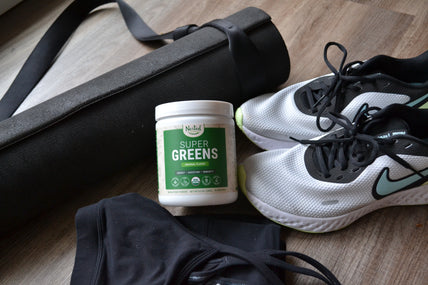What Does a B-Vitamin Deficiency Feel Like?

B-vitamins tend to remind me of a family, or a group of siblings. They may have similar names, but they’re all very different from each other and play important roles in many different systems in the body.
Here’s everything you need to know about B-vitamins.
What are B-complex vitamins?
Vitamin B-complex is actually a group of vitamins that include eight B-vitamins, which are all essential for maintaining optimum health and proper body functioning. You may know them by number or by name:
- B1 (Thiamine) helps the body make new cells, and is important for brain and nerve function as well as energy use throughout the body.
- B2 (Riboflavin) helps make and transport energy in the body. It also assists with brain function, and makes chemicals that help with fighting free radicals.

A variety of the B-Vitamins can be found in broccoli, tomatoes, carrots, leafy greens, avocados, nuts, whole grains, beans, mushrooms, dark green vegetables, mushrooms, almonds, quinoa, spinach.
- B3 (Niacin) is an essential part of using and storing energy in the body, and helps regulate the nervous and digestive systems.
- B5 (Pantothenic acid) breaks down fats and carbohydrates for energy and is responsible for the production of hormones.
- B6 (Pyridoxine) helps the body turn food into energy, and aids in fighting infection.
- B7 (Biotin) is essential for the metabolism of carbohydrates and fats, and helps to synthesize amino acids and fatty acids.
- B9 (Folic acid) is necessary for the formation of hemoglobin, improves focus and alertness, and plays a key role in copying and repairing DNA – which makes it especially important in growth.
- B12 (Cobalamin) helps regulate the central nervous system, and is involved in the formation of red blood cells.
Most people take B-complex vitamins to help increase energy, enhance mood, improve memory, boost skin and hair health and stimulate the immune system. Some experts also claim that B-vitamins can help people with anxiety and depression, and aid in reducing the severity of PMS symptoms.
What does a B-vitamin deficiency feel like?
With the right diet, it should be easy to get the proper amount of B-vitamins, but many of us do not. The symptoms of a B-vitamin deficiency may vary depending on the type of B-vitamin that you’re lacking.
Who’s at risk?
Certain groups of people may have an increased risk of vitamin B deficiency, such as those who:
– Are over the age of 50
– Are on a vegetarian or vegan diet
– Have celiac disease
– Have Crohn’s disease
– Have gastritis or other digestive disorders
– Have had stomach/weight loss surgery
Other things that rob the body of B-vitamins
Although B-vitamins are available in a variety of different foods, they are water-soluble and cannot be stored in body tissue. As such, you’ll need to renew your supply of Bs every day, and avoid the following nutrient thieves:
1. Alcohol
Large quantities of alcohol can quickly deplete your body’s stores of B-vitamins. Not only that, but alcohol also interferes with your ability to absorb and utilize Bs (and other nutrients).
2. Refined sugars/starches
Foods that are high in white sugar and bleached flours tend to require additional amounts of B-vitamins to convert and metabolize them. This may end up starving other systems in your body which also need B-vitamins to function optimally.
3. Stress

Stress will deplete your B-vitamins like nobody’s business. That’s because your body burns through lots of B-vitamins to create stress hormones. While your body pumps out the cortisol and adrenaline necessary to get the monkey off your back, other systems get B-starved.
When you’re stressed, your body burns through a lot of B-vitamins to create stress hormones (cortisol and adrenaline) to help it deal with the added pressure. This can rapidly use up whatever Bs you had stocked up…. especially vitamins B5, B3 and B9.
4. Caffeine
Drinks and food that contain caffeine (like coffee, tea and cola) can have a mildly diuretic effect on your body. If consumed in excess, they may end up flushing essential B-vitamins from your body.
5. Medications
Certain prescription medications can leach B-vitamins from your body or interfere with their normal absorption and utilization. For instance, antibiotics and birth control pills can deplete B-vitamin stores, while all non-steroidal anti-inflammatory drugs (NSAIDs) can leach folic acid from your body.
How to get more B-vitamins from a vegetarian/vegan diet
Most B-complex vitamins are found mainly in animal products (like meat, fish and dairy). Sadly, some B-vitamins aren’t usually found in high levels in plants – which is why some of our vegetarian and vegan friends sometimes need to turn to fortified foods or supplements in order to get sufficient vitamin Bs in their diet.
However, don’t despair. Even if you primarily follow a plant-based diet, there are still plenty of options available to help ensure that you get an abundance of each B.
Vitamin B1

Want a breakfast that’s rich in vitamin B3? Try starting your day with a slice of whole-grain toast slathered with natural peanut butter.
Thiamine can easily be found in foods like rice, dark green vegetables, black beans, acorn squash, sunflower seeds, pasta, cereal and baker’s yeast. If you need more B1 in your diet, try mixing up a salad or blending some leafy vegetables into a green smoothie.
Vitamin B2
Riboflavin can be obtained from foods like oatmeal, mushrooms, almonds, quinoa, spinach, apples and kidney beans. Additionally, it’s also found in prunes, and buckwheat.
Vitamin B3
Some niacin-rich foods include broccoli, tomatoes, carrots, dates, sweet potatoes, leafy greens, avocados, nuts, whole grains, beans, mushrooms and nutritional yeast. Want a breakfast that’s rich in vitamin B3? Try starting your day with a slice of whole-grain toast slathered with natural peanut butter.
Vitamin B5

For a great dose of B5, try some quinoa with nutritional yeast and broccoli.
Pantothenic acid can be found in corn, cauliflower, kale, tomatoes, avocado, legumes, lentils, split peas, peanuts, soybeans, sweet potatoes, sunflower seeds, whole-grain breads/cereals and wheat germ. For a great dose of B5, try some quinoa with nutritional yeast and broccoli.
Vitamin B6
Pyridoxine is found in foods like chickpeas, potatoes, bananas, tomato sauce, bulgur, winter squash, rice, nuts, raisins, onions, spinach, tofu and watermelon.
Vitamin B7
You can get more biotin naturally by eating almonds, peanuts, pecans, walnuts, nut butter, soybeans (and other legumes), whole grains, cauliflower, bananas, and mushrooms.
Vitamin B9

Nested Naturals B-Complex provides a natural boost to energy, mood and metabolism, especially for people under stress, vegans & vegetarians.
For folate, eat more spinach, black-eyed peas, green peas, asparagus, enriched pasta, brussels sprouts, romaine lettuce, avocado, kidney beans, peanuts, oranges and orange juice, papaya, banana and cantaloupe.
Vitamin B12
Last but not least, cobalamin is easily and abundantly found in spirulina. It can also be obtained from nutritional yeast, fortified soy milk and cereals.
Sources:
http://vitamins.lovetoknow.com/Facts_About_Vitamin_B
https://www.verywell.com/b-complex-vitamins-89411
http://healthyeating.sfgate.com/vitamin-b-robbers-3356.html
https://www.popsugar.com/fitness/Vegan-Sources-B-Vitamins-41330870
http://www.onegreenplanet.org/natural-health/b-vitamins-how-to-get-them-in-a-vegan-diet



